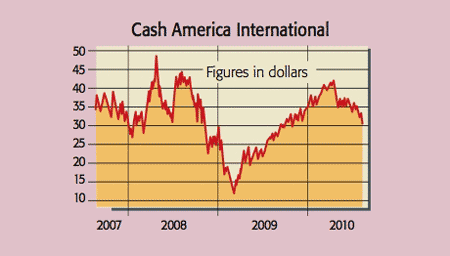
US consumers are feeling pretty gloomy right now. And it’s no surprise. The weak US housing market and rampant unemployment have left the average American’s personal finances in a terrible state. American consumer bankruptcy is up 9% in the past year. Yet these grim conditions aren’t bad news for everyone. The ‘great stagnation’ spells opportunity for one industry: pawnbroking.
That’s because the economic slump has swelled the ranks of those who have little or no access to conventional bank credit. The US non-profit Center for Financial Services Innovation (CFSI) estimates that between 30 million and 40 million households are now “financially under-served”. The “underbanked market has grown as a result of the financial crisis and the Great Recession,” says CFSI director Jennifer Tescher. And the pain isn’t just being felt in the US. In Britain, an estimated 5.6 million adults with a bank account can’t get credit, while nine million are refused conventional credit every year.
Indeed, the industry was already enjoying a renaissance before the credit crunch. In 1988 there were 8,000 pawn shops in the US; now there are around 15,000, servicing an estimated 30 million customers. Industry-wide profits are hard to gauge as 90% of the fragmented market is privately held. Yet the growth in the number of shops and the impressive results of America’s three publicly listed outfits indicate that demand for their services is strong. The larger firms have developed the business model and expanded the industry footprint. Pawnbrokers now offer extra financial products, such as cash advances and cheque conversion, while the industry is regulated as a branch of consumer finance. The US National Pawnbrokers’ Association (NPA) says the ideal pawnbroker’s premises should resemble a “small bank branch in a grocery store”.
This switch to adding financial services has been a lucrative one. Payday advances, as they are called in America, have grown from practically nothing in the mid-1990s to a $40bn industry. But a more traditional aspect of the pawn industry has also been good for profits recently: the focus on jewellery, which, according to the NPA, “accounts for over 50% of items pledged for a pawn loan or offered for sale”. The industry has traditionally favoured jewellery as collateral for loans because it’s durable, easy to value, store and resell.
Special FREE report from MoneyWeek magazine: Don’t be fooled – house prices will fall again!
- Why UK property prices are set to collapse by 30%
- When it will be time to get back in and buy up dirt cheap property
This means that gold’s bull run of the past decade has also been extremely good for pawnbrokers. That’s because if clients don’t repay the loan, they forfeit the collateral item they placed with a broker. In effect, this means that brokers often get to buy gold at a steep discount. What’s more, pawnbrokers have been quick to react to the market, setting up temporary gold ‘bars’ in shopping centres, to buy more gold from the public. With the gold price likely to keep rising, this extra boost to pawnbroking should be sustainable.
Pawnbrokers do attract a lot of criticism for dealing in people’s misery, and they might not be everyone’s idea of an ethical investment. Yet they also offer a vital line of credit for those who can’t get it from the banks. Rates vary, although APRs of 70% are common. While that’s very expensive, it still works out cheaper than other ‘last ditch’ measures, such as unauthorised overdrafts, or loan sharks. We look at the best American play on the sector below.
The best bet in the sector
Cash America International (NYSE: CSH) is a leading US provider of pawn lending and small loan services.
The firm has a large and growing network of 1,000 US stores, and also plans to continue to grow in Mexico, where it owns 176 shops. CEO Daniel Feehan admits pawn operations received “a big assist” from rising gold prices, but he’s also looked for new revenue streams. To that end, the firm has launched an internet cash advance service in Britain, Australia and Canada, which offers small loans “until payday”. These services cater for the growing numbers of people being rejected for conventional bank credit.
The group’s second-quarter reports showed that year-on-year sales and total assets are up, while total debt is down. And this is no one off. The firm has reported rising revenue and earnings per share from continuing operations, for every one of the last five years.
Yet despite the healthy balance sheet and strong fundamentals, Cash America International is cheap. The firm is trading at around $31, below its average price for the last five years, even though earnings have risen in that time. As a result it’s on a p/e of 7.35 for 2011, well below the average of 13.8 over the last five years.
• This article was originally published in MoneyWeek magazine issue number 500 on 20 August 2010, and was available exclusively to magazine subscribers. To read more articles like this, ensure you don’t miss a thing, and get instant access to all our premium content, subscribe to MoneyWeek magazine now and get your first three issues free.